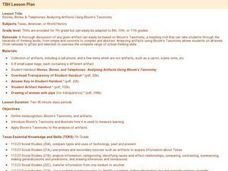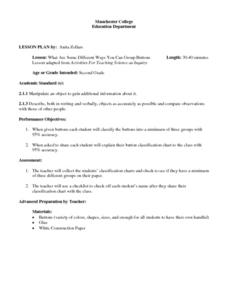Curated OER
Mississippi Trial, 1955: A Request Strategy for Questioning
Knowledge, comprehension, application, analysis, synthesis, evaluation. Class members use Bloom's taxonomy to craft six levels of discussion questions for Chris Crowe's novel, Mississippi Trial, 1955. Model questions from Chapter 3, a...
Curated OER
Forming Open-Ended Questions
Help readers learn to create their own open-ended questions for any text you are working with. Using Bloom's Taxonomy, learners begin on the lower levels and work their way up to form questions that focus on synthesis instead of simple...
Curated OER
AP: Chapter 25: Phylogeny and Systematics
As a review or note taking guide, this resource wraps up a unit on the tree of life. Biology bigwigs define phylogeny and answer questions about the subsequent classification of organisms. The learning exercise takes a straightforward...
Curated OER
Ordinary People: Cubing Strategy
Readers of Ordinary People employ a cubing strategy based on Bloom’s Taxonomy to analyze, from multiple perspectives, an excerpt from Chapter 10 of Judith Guest’s novel. The excerpt, a rationale and complete directions for the activity...
K-State Research and Extensions
You Ol’ Fossil
Geologists are gneiss, tuff, and a little bit wacke. The fifth chapter of seven includes ten activities at four different levels. The hands-on activities cover fossils including how they are formed, vertebrates, invertebrates,...
Conneticut Department of Education
Instructional Strategies That Facilitate Learning Across Content Areas
Imagine 28 instructional strategies, appropriate for all subject areas and all grade levels. Directed Reading-Thinking Activities (DRTA), Question-Answer Relationship (QAR) activities, KWL charts, comparison matrixes, classification...
Curated OER
Insect Classification
Sixth graders learn the classification system of living organisms. They identify general body parts of an insect, learn insect classification into orders, families, genus and species, and classify given insects by using a scientific...
Curated OER
Classification
Students gather and classify samples of a given item (rocks, fossils, seeds, etc.) They discuss various ways of classifying and that there are many different ways that are acceptable.
Curated OER
Vertebrate Classification Challenge
Students determine which animals belong to the vertebrate phyla. In this classification lesson, students are given large papers with the names of the phyla of vertebrates. They must work together to place organisms into their correct...
Curated OER
Stones, Bones & Telephones: Analyzing Artifacts Using Bloom's Taxonomy
Seventh graders define metacognition, Bloom's Taxonomy, and artifacts. They, in groups, try to identify a mystery artifact using the Artifact Analysis sheet. They present their findings to the class.
Curated OER
Scientific Classification
In this scientific classification worksheet, students read about classification and the questions scientists ask in order to classify, then read about features of different classifications of animals. Worksheet is informational, no...
Curated OER
Taxonomy - Bluebird Classification
In this bluebird classification worksheet, students click on the link to find information about the lineage of bluebirds and create a step by step classification chart. Students complete 8 spaces in the chart.
Curated OER
Bird Classification
In this bird classification worksheet, learners are given a group of birds and then are to determine how they are similar or different from each other. Students read about 14 birds.
Curated OER
Natural Selection Day 1
Students define the concept of classification. In groups, they categorize a series of objects into categories they identify. As a class, they participate in a variety of activities to examine the concept of natural selection. To end...
Curated OER
Colors of our Earth
Young scholars are introduces to soil profile classification. They remember that classification of soils is an important aspect of studying soils as it aids in predicting how soils react to weathering, transport nutrients or pollution. ...
Curated OER
Classifying Commercial Marine Species
Students investigate taxonomy. They explore some of the commercial marine species caught in Magdalena Bay and develop a classification system for presented animals.
Curated OER
What Are Some Different Ways You Can Group Buttons
Second graders classify and group buttons. They discuss how their buttons are alike and different, and identify the characteristics of their handful of buttons. Students then classify their buttons into three groups, and create a...
Curated OER
Classifying
In this classifying activity, students are given 8 rows of illustrations of animals. Students try out various ways to organize the animals in a classification system following the directions. They try a 2 groups system and a 3-5 group...
Curated OER
Classifying Vertebrates
Second graders study animal characteristics and classification. In this animal characteristics and classifications lesson, 2nd graders determine how to classify vertebrates which include mammals, reptiles, amphibians, birds, and fish....
Curated OER
Biology In Elementary Schools
Students classify animals into six major animal groups and describe the characteristics of the animals found within each group. In this living and non-living animals instructional activity, students observe a variety of animals, both...
Curated OER
SORTING ALL SORTS
Students examine how the method of classification is used. In this sorting lesson students take a pre-test, classify organisms and complete a crossword puzzle.
Curated OER
Classifying Candy I
Young scholars explore the observable properties of matter. They develop two binary classification systems using concrete objects. based on two different properties of the concrete objects.
Curated OER
What Is a Species?
Students are able to recognize that scientists use different definitions of species. They are able to assess the strengths and limitations of species definitions depending on their context. Students are able to use definitions of...
Curated OER
I Know What I Am... but, What Are You? (Classifying Living Things)
Learners examine how to classify living things by effects, environment, and activity. They explore various websites, develop a list of facts they learn about classifications, and participate in a distance online learning session with the...
Other popular searches
- Taxonomy
- Bloom's Taxonomy
- Using Taxonomy
- Blooms Taxonomy
- Math Classification
- Animal Classifications
- Plant Classification
- Classifying Animals
- Classification of Animals
- Animal Kingdom
- Soil Classification
- Classification Keys

























